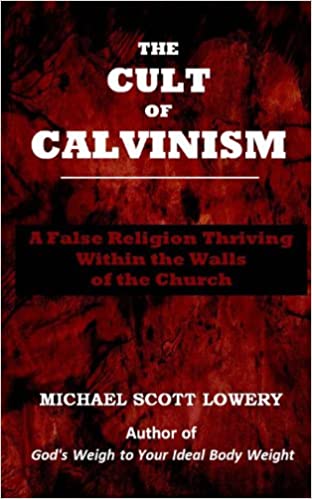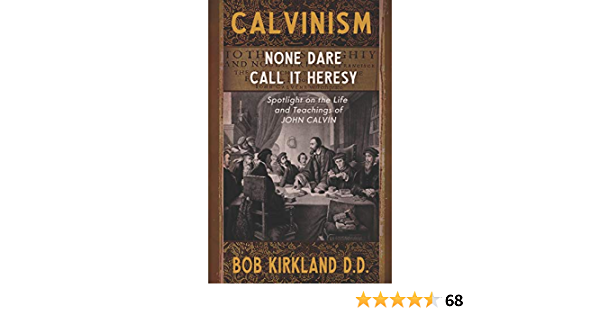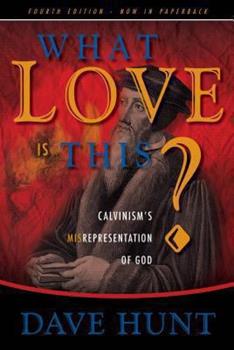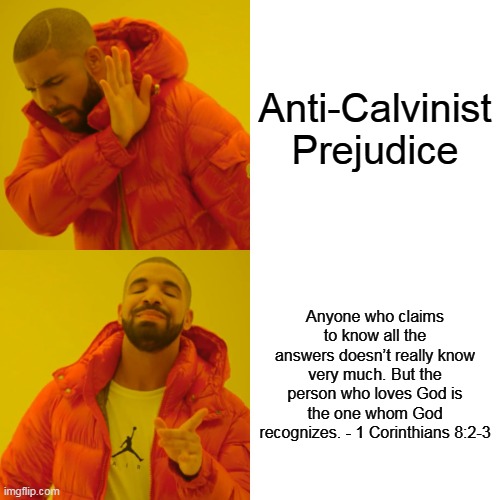- May 17, 2021
- 1,121
- 387
- 38
- Country
- United States
- Faith
- Protestant
- Marital Status
- Divorced
Limited atonement is the hardest doctrine of Calvinism to accept. For this reason, there are four-point Calvinists:
https://www.gotquestions.org/Amyraldism.html
Everyone limits the atonement in some way. Those who believe in unlimited atonement limit the atonement’s power, that Jesus died for people who end up in hell.
Those who believe in limited atonement limit its extent, that Jesus died only for His elect, who will without fail be saved, so not a drop of Jesus’ blood was wasted.
In His torture and death, Jesus suffered the full measure of God’s wrath for sin. Limited atonement means that not an iota of Jesus’ suffering was endured in vain.
Until they repent and believe, it's impossible to tell who God's elect might be, so the Gospel must be preached indiscriminately. Matthew 28:19, Mark 16:15, Luke 14:23
God promised Abraham that his descendants would be as innumerable as the stars:
Genesis 15:5
Then He brought him outside and said, “Look now toward heaven, and count the stars if you are able to number them.” And He said to him, “So shall your descendants be.”
Christians, by faith, are children of Abraham:
Galatians 3:7
Therefore know that only those who are of faith are sons of Abraham.
While the atonement is limited in extent, it covers innumerable children of Abraham.
Unless you are a universalist, you believe that only Christians will be saved. That's what Calvinists believe as well, and the number of saved Christians will be many, as Jesus promised. Matthew 20:28, Mark 10:45
Limited atonement is the teaching that Jesus didn't die for non-Christians who never accept the Gospel. It's not some scary teaching. Jesus died as a "ransom for many," those who accept the Gospel, not for those who reject it.
Limited atonement is simply the teaching that Jesus didn't die for those who live their entire lives rejecting the Gospel, so that not a drop of Jesus' blood was wasted. The more we sympathize with the sufferings of Jesus, the more likely we might be to accept limited atonement.
https://tubitv.com/movies/550864/the-passion-of-the-christ
Tubi is a legal source to watch free movies online.
If you are among God's elect, His people, Jesus purchased you with the shedding of his blood.
Luke 1:68
Blessed be the Lord God of Israel, for he has visited and redeemed His people
Ephesians 4:30
And do not grieve the Holy Spirit of God, by whom you were sealed for the day of redemption.
Isaiah 53:5
But He was wounded for our transgressions,
He was bruised for our iniquities;
The chastisement for our peace was upon Him,
And by His stripes we are healed.
If your apartment building was burning down, and a firefighter died while saving you but not your neighbor, what would your proper response be?
Should you gripe and grumble about how unfair it was that the firefighter gave up his life for you, but not your neighbor? Or should you be thankful for his sacrifice?
There is nothing unfair about God’s sovereignty in election.(Romans 9:21) No one who desires to be saved will be turned away. (John 6:37) If you sincerely care about your salvation, that’s a sign you are among God’s elect.
It's because I love Jesus that I believe in limited atonement, that not a drop of His blood was shed in vain. Also, the doctrine of unlimited atonement seems to put the Persons of the Trinity at odds with one another:
John 3:16 and 1 John 2:2 are interpreted to mean that God intends to save all people without exception, but they must be read in context of other passages of John’s writings:
John 11
51 Now this he did not say on his own authority; but being high priest that year he prophesied that Jesus would die for the nation,
52 and not for that nation only, but also that He would gather together in one the children of God who were scattered abroad.
John 17:9
I am praying for them. I am not praying for the world but for those whom you have given me, for they are yours.
John 11:52 says that Jesus died, not for all people without exception, but for “the children of God who were scattered abroad,” just as Jesus says in His priestly prayer of John 17:9 that He wasn’t praying for the whole world, but to those given to Him by the Father for salvation.
If John meant the whole world without exception, then the entire world must have been following Jesus in John 12:19, rather than just a large crowd.
John 12:19
The Pharisees therefore said among themselves, Perceive ye how ye prevail nothing? behold, the world is gone after him.
John’s references to Jesus dying for the world’s sins includes people from all nations, tribes, peoples, and tongues, rather than every individual without exception.
Revelation 7:9
After these things I looked, and behold, a great multitude which no one could number, of all nations, tribes, peoples, and tongues, standing before the throne and before the Lamb, clothed with white robes, with palm branches in their hands
When John 12:32 is interpreted as referring to all people without exception, rather than all kinds of people in every ethnic group and station of life, the conclusion is universalism, which is an unbiblical teaching.
John 12:32
And I, if I am lifted up from the earth, will draw all people to Myself.
The Greek word translated as “draw” is “helko,” which means “to drag.” John 12:32 must be read in context of John 6:44, which promises that all who are drawn to Jesus will inherit the resurrection unto life on the last day:
John 6:44
No one can come to Me unless the Father who sent Me draws him; and I will raise him up at the last day.
When 1 Timothy 2:4 says that God desires “all people” to be saved, this must be read in context of 1 Timothy 2:2, “kings and all who are in high positions.” God desires to save all kinds of people, regardless of their station in life.
2 Peter 3:9
The Lord is not slack concerning His promise, as some count slackness, but is longsuffering toward us, not willing that any should perish but that all should come to repentance.
If God is not willing that anyone in the world, without exception, should perish, then He seems to be failing miserably with so many ending up in hell. The “any” and “all” in 2 Peter 3:9 seem to be referring only to the elect.
The Epistle to the Hebrews presents Jesus as high priest of the New Covenant. Just as the high priest in ancient Israel presented the sacrifice for Israel alone, and not everyone in the world, Jesus offers up Himself on behalf of the elect:
Hebrews 2:17
For this reason he had to be made like them, fully human in every way, in order that he might become a merciful and faithful high priest in service to God, and that he might make atonement for the sins of the people.
Hebrews 13:12
Therefore Jesus also, that He might sanctify the people with His own blood, suffered outside the gate.
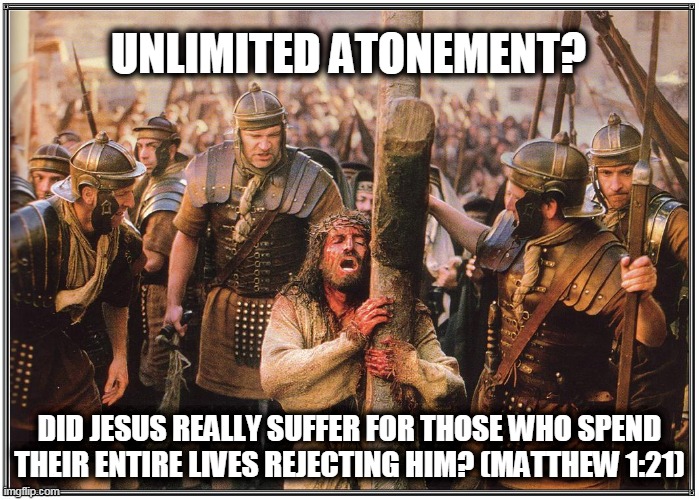
John 10
15 As the Father knows Me, even so I know the Father; and I lay down My life for the sheep.
16 And other sheep I have which are not of this fold; them also I must bring, and they will hear My voice; and there will be one flock and one shepherd.
26 But you do not believe, because you are not of My sheep
If you truly care about the salvation of the lost, you should support evangelism, since the preaching of the Gospel is the means God has ordained to awaken faith in His elect. Some of the greatest missionaries have been Calvinists.
John 12:32
And I, if I am lifted up from the earth, will draw all peoples to Myself.
When John 12:32 is interpreted as referring to all people without exception, rather than all kinds of people in every ethnic group and station of life, the conclusion is universalism, which is an unbiblical teaching.
The Greek word translated as “draw” is “helko,” which means “to drag.” John 12:32 must be read in context of John 6:44, which promises that all who are drawn to Jesus will inherit the resurrection unto life on the last day:
John 6:44
No one can come to Me unless the Father who sent Me draws him; and I will raise him up at the last day.
If Jesus were drawing all people to Himself without exception, then so many wouldn’t have turned away:
John 6
64 But there are some of you who do not believe.” For Jesus knew from the beginning who they were who did not believe, and who would betray Him.
65 And He said, “Therefore I have said to you that no one can come to Me unless it has been granted to him by My Father.”
If Jesus were drawing all people to Himself without exception, He wouldn’t have said this to the Pharisees:
John 10:26
But you do not believe, because you are not of My sheep, as I said to you.
John 3:16 and 1 John 2:2 are interpreted to mean that God intends to save all people without exception, but they must be read in context of other passages of John’s writings:
John 11
51 Now this he did not say on his own authority; but being high priest that year he prophesied that Jesus would die for the nation, 52 and not for that nation only, but also that He would gather together in one the children of God who were scattered abroad.
John 17:9
I am praying for them. I am not praying for the world but for those whom you have given me, for they are yours.
John 11:52 says that Jesus died, not for all people without exception, but for “the children of God who were scattered abroad,” just as Jesus says in His priestly prayer of John 17:9 that He wasn’t praying for the whole world, but to those given to Him by the Father for salvation.
If John meant the whole world without exception, then the entire world must have been following Jesus in John 12:19, rather than just a large crowd.
John 12:19
The Pharisees therefore said among themselves, Perceive ye how ye prevail nothing? behold, the world is gone after him.
John’s references to Jesus dying for the world’s sins includes people from all nations, tribes, peoples, and tongues, rather than every individual without exception.
Revelation 7:9
After these things I looked, and behold, a great multitude which no one could number, of all nations, tribes, peoples, and tongues, standing before the throne and before the Lamb, clothed with white robes, with palm branches in their hands
According to Arminian theologian Kenneth Grider, the Arminian rejection of limited atonement ultimately leads to rejecting penal substitution altogether:
https://www.gotquestions.org/Amyraldism.html
Everyone limits the atonement in some way. Those who believe in unlimited atonement limit the atonement’s power, that Jesus died for people who end up in hell.
Those who believe in limited atonement limit its extent, that Jesus died only for His elect, who will without fail be saved, so not a drop of Jesus’ blood was wasted.
In His torture and death, Jesus suffered the full measure of God’s wrath for sin. Limited atonement means that not an iota of Jesus’ suffering was endured in vain.
The Bible speaks clearly of Jesus laying down his life for his sheep (John 10:11-13). In that context, he says of certain people, ‘Ye are not of my sheep’ (v. 26). Scripture also speaks of Christ laying down his life for the children of God (John 11:51-52); dying for his church (Eph. 5:25-27, Acts 20:28); saving his people (Matt. 1:28); giving his life a ransom for many (Matt. 20:28); seeing his seed (Isa. 53:10, Psa. 22); and redeeming his own from iniquity (Titus 2:14) – all as having already happened (Rev. 5:9).
In sum, Christ died to satisfy the justice of God for his people’s sins. He saved a definite number of people whom he refers to as his people, his sheep, and his elect (Matt. 1:21, John 10:11-15, Rom. 8:28-39).
https://banneroftruth.org/us/resources/articles/2009/definite-atonement/
Until they repent and believe, it's impossible to tell who God's elect might be, so the Gospel must be preached indiscriminately. Matthew 28:19, Mark 16:15, Luke 14:23
God promised Abraham that his descendants would be as innumerable as the stars:
Genesis 15:5
Then He brought him outside and said, “Look now toward heaven, and count the stars if you are able to number them.” And He said to him, “So shall your descendants be.”
Christians, by faith, are children of Abraham:
Galatians 3:7
Therefore know that only those who are of faith are sons of Abraham.
While the atonement is limited in extent, it covers innumerable children of Abraham.
Unless you are a universalist, you believe that only Christians will be saved. That's what Calvinists believe as well, and the number of saved Christians will be many, as Jesus promised. Matthew 20:28, Mark 10:45
Limited atonement is the teaching that Jesus didn't die for non-Christians who never accept the Gospel. It's not some scary teaching. Jesus died as a "ransom for many," those who accept the Gospel, not for those who reject it.
Limited atonement is simply the teaching that Jesus didn't die for those who live their entire lives rejecting the Gospel, so that not a drop of Jesus' blood was wasted. The more we sympathize with the sufferings of Jesus, the more likely we might be to accept limited atonement.
https://tubitv.com/movies/550864/the-passion-of-the-christ
Tubi is a legal source to watch free movies online.
If you are among God's elect, His people, Jesus purchased you with the shedding of his blood.
Luke 1:68
Blessed be the Lord God of Israel, for he has visited and redeemed His people
The only proper response is your love and obedience. If Jesus died for the full weight of your sin, then the more you sin, the more you add to His sufferings.Redeem
to buy or pay off; clear by payment:
to redeem a mortgage.
Definition of redeem | Dictionary.com
Ephesians 4:30
And do not grieve the Holy Spirit of God, by whom you were sealed for the day of redemption.
Isaiah 53:5
But He was wounded for our transgressions,
He was bruised for our iniquities;
The chastisement for our peace was upon Him,
And by His stripes we are healed.
If your apartment building was burning down, and a firefighter died while saving you but not your neighbor, what would your proper response be?
Should you gripe and grumble about how unfair it was that the firefighter gave up his life for you, but not your neighbor? Or should you be thankful for his sacrifice?
There is nothing unfair about God’s sovereignty in election.(Romans 9:21) No one who desires to be saved will be turned away. (John 6:37) If you sincerely care about your salvation, that’s a sign you are among God’s elect.
It's because I love Jesus that I believe in limited atonement, that not a drop of His blood was shed in vain. Also, the doctrine of unlimited atonement seems to put the Persons of the Trinity at odds with one another:
The Lord Jesus prayed in John 17 and repeatedly referred to those people that the Father had given Him. From eternity past, the glorious Father gave a particular, a special, a peculiar people to the Son. These are particular souls. These are divinely chosen ones. The Son came in human flesh to live for & die for these particular ones that the Father gave Him. All that the Father gave to the Son were fully pardoned at Calvary. The Spirit of God grants life to all who are elect. He gives life to them. The Father and the Son give life to a particular group of individuals. And thus, the Son came to redeem them. To pit the Son of God against the Father and the Spirit would make the members of the Triune Godhead to be at odds with each other. And this cannot be. The Godhead always works in glorious concert, beauty, happiness, and harmony together.
Why Definite Atonement (Particular Redemption) Must Be True - The Aquila Report
John 3:16 and 1 John 2:2 are interpreted to mean that God intends to save all people without exception, but they must be read in context of other passages of John’s writings:
John 11
51 Now this he did not say on his own authority; but being high priest that year he prophesied that Jesus would die for the nation,
52 and not for that nation only, but also that He would gather together in one the children of God who were scattered abroad.
John 17:9
I am praying for them. I am not praying for the world but for those whom you have given me, for they are yours.
John 11:52 says that Jesus died, not for all people without exception, but for “the children of God who were scattered abroad,” just as Jesus says in His priestly prayer of John 17:9 that He wasn’t praying for the whole world, but to those given to Him by the Father for salvation.
If John meant the whole world without exception, then the entire world must have been following Jesus in John 12:19, rather than just a large crowd.
John 12:19
The Pharisees therefore said among themselves, Perceive ye how ye prevail nothing? behold, the world is gone after him.
John’s references to Jesus dying for the world’s sins includes people from all nations, tribes, peoples, and tongues, rather than every individual without exception.
Revelation 7:9
After these things I looked, and behold, a great multitude which no one could number, of all nations, tribes, peoples, and tongues, standing before the throne and before the Lamb, clothed with white robes, with palm branches in their hands
When John 12:32 is interpreted as referring to all people without exception, rather than all kinds of people in every ethnic group and station of life, the conclusion is universalism, which is an unbiblical teaching.
John 12:32
And I, if I am lifted up from the earth, will draw all people to Myself.
The Greek word translated as “draw” is “helko,” which means “to drag.” John 12:32 must be read in context of John 6:44, which promises that all who are drawn to Jesus will inherit the resurrection unto life on the last day:
John 6:44
No one can come to Me unless the Father who sent Me draws him; and I will raise him up at the last day.
When 1 Timothy 2:4 says that God desires “all people” to be saved, this must be read in context of 1 Timothy 2:2, “kings and all who are in high positions.” God desires to save all kinds of people, regardless of their station in life.
2 Peter 3:9
The Lord is not slack concerning His promise, as some count slackness, but is longsuffering toward us, not willing that any should perish but that all should come to repentance.
If God is not willing that anyone in the world, without exception, should perish, then He seems to be failing miserably with so many ending up in hell. The “any” and “all” in 2 Peter 3:9 seem to be referring only to the elect.
The Epistle to the Hebrews presents Jesus as high priest of the New Covenant. Just as the high priest in ancient Israel presented the sacrifice for Israel alone, and not everyone in the world, Jesus offers up Himself on behalf of the elect:
Hebrews 2:17
For this reason he had to be made like them, fully human in every way, in order that he might become a merciful and faithful high priest in service to God, and that he might make atonement for the sins of the people.
Hebrews 13:12
Therefore Jesus also, that He might sanctify the people with His own blood, suffered outside the gate.

John 10
15 As the Father knows Me, even so I know the Father; and I lay down My life for the sheep.
16 And other sheep I have which are not of this fold; them also I must bring, and they will hear My voice; and there will be one flock and one shepherd.
26 But you do not believe, because you are not of My sheep
If you truly care about the salvation of the lost, you should support evangelism, since the preaching of the Gospel is the means God has ordained to awaken faith in His elect. Some of the greatest missionaries have been Calvinists.
John 12:32
And I, if I am lifted up from the earth, will draw all peoples to Myself.
When John 12:32 is interpreted as referring to all people without exception, rather than all kinds of people in every ethnic group and station of life, the conclusion is universalism, which is an unbiblical teaching.
The Greek word translated as “draw” is “helko,” which means “to drag.” John 12:32 must be read in context of John 6:44, which promises that all who are drawn to Jesus will inherit the resurrection unto life on the last day:
John 6:44
No one can come to Me unless the Father who sent Me draws him; and I will raise him up at the last day.
If Jesus were drawing all people to Himself without exception, then so many wouldn’t have turned away:
John 6
64 But there are some of you who do not believe.” For Jesus knew from the beginning who they were who did not believe, and who would betray Him.
65 And He said, “Therefore I have said to you that no one can come to Me unless it has been granted to him by My Father.”
If Jesus were drawing all people to Himself without exception, He wouldn’t have said this to the Pharisees:
John 10:26
But you do not believe, because you are not of My sheep, as I said to you.
John 3:16 and 1 John 2:2 are interpreted to mean that God intends to save all people without exception, but they must be read in context of other passages of John’s writings:
John 11
51 Now this he did not say on his own authority; but being high priest that year he prophesied that Jesus would die for the nation, 52 and not for that nation only, but also that He would gather together in one the children of God who were scattered abroad.
John 17:9
I am praying for them. I am not praying for the world but for those whom you have given me, for they are yours.
John 11:52 says that Jesus died, not for all people without exception, but for “the children of God who were scattered abroad,” just as Jesus says in His priestly prayer of John 17:9 that He wasn’t praying for the whole world, but to those given to Him by the Father for salvation.
If John meant the whole world without exception, then the entire world must have been following Jesus in John 12:19, rather than just a large crowd.
John 12:19
The Pharisees therefore said among themselves, Perceive ye how ye prevail nothing? behold, the world is gone after him.
John’s references to Jesus dying for the world’s sins includes people from all nations, tribes, peoples, and tongues, rather than every individual without exception.
Revelation 7:9
After these things I looked, and behold, a great multitude which no one could number, of all nations, tribes, peoples, and tongues, standing before the throne and before the Lamb, clothed with white robes, with palm branches in their hands
According to Arminian theologian Kenneth Grider, the Arminian rejection of limited atonement ultimately leads to rejecting penal substitution altogether:
A spillover from Calvinism into Arminianism has occurred in recent decades. Thus many Arminians whose theology is not very precise say that Christ paid the penalty for our sins. Yet such a view is foreign to Arminianism, which teaches instead that Christ suffered for us. Arminians teach that what Christ did he did for every person; therefore what he did could not have been to pay the penalty, since no one would then ever go into eternal perdition. Arminianism teaches that Christ suffered for everyone so that the Father could forgive the ones who repent and believe; his death is such that all will see that forgiveness is costly and will strive to cease from anarchy in the world God governs. This view is called the governmental theory of the atonement.
Arminianism
Last edited:


